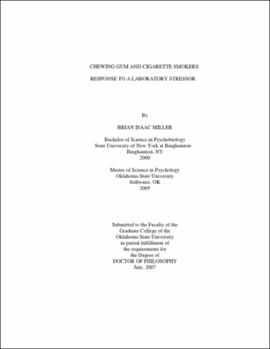| dc.contributor.advisor | Collins, Frank L. | |
| dc.contributor.author | Miller, Brian Isaac | |
| dc.date.accessioned | 2013-11-26T08:27:43Z | |
| dc.date.available | 2013-11-26T08:27:43Z | |
| dc.date.issued | 2007-07 | |
| dc.identifier.uri | https://hdl.handle.net/11244/6965 | |
| dc.description.abstract | Scope and Method of Study: Several studies have suggested that chewing gum can assist individuals to manage symptoms associated with nicotine withdrawal. Likewise, recent work in our laboratory has indicated that chewing gum may aid dependent smokers in recovery from a laboratory stressor; however, this was not replicated with nonsmokers. Collectively, this research suggests that chewing gum may function by reducing overall stress levels associated with removal of nicotine from the body, and at least for smokers, it helps reduce laboratory stress. The present study was designed to extend previous research by reexamining the relation between gum chewing and stress reduction in smokers experiencing acute nicotine withdrawal, as well as a potential mechanism for the stress reduction by using a non-chewing oral control (breath strips) that share flavor properties of gum without chewing. Participants were assigned to four conditions: Chewing Gum, Breath Strip (Chewing Control), Cigarette, and Non-oral Control. A total of 56 participants were studied (14 per group). The experimental procedure was identical to previous studies conducted in our laboratory which indicated that chewing gum was helpful in the recovery from acute stress. Participants were exposed to a public speaking task followed by a 30 minute recovery period. Measures of subjective stress were obtained using the State-Trait Anxiety Inventory and the Emotion Assessment Scale. Symptoms of acute nicotine withdrawal were obtained using the Tobacco Withdrawal Symptom Checklist and a measure developed for the present study. | |
| dc.description.abstract | Findings and Conclusions: Analyses indicated that the public speaking task was successful in significantly increasing levels of negative emotions for all participants irrespective of group assignment. Post-stressor, significant reductions in anxiety were observed; however, these reductions also occurred irrespective of group. Overall, the results of the present study found that dependent smokers were not aided by chewing gum as a means to regulate negative emotions. Additionally, gum chewing was not found to be associated with the amelioration of symptoms associated with acute nicotine withdrawal. | |
| dc.format | application/pdf | |
| dc.language | en_US | |
| dc.rights | Copyright is held by the author who has granted the Oklahoma State University Library the non-exclusive right to share this material in its institutional repository. Contact Digital Library Services at lib-dls@okstate.edu or 405-744-9161 for the permission policy on the use, reproduction or distribution of this material. | |
| dc.title | Chewing gum and cigarette smokers: Response to a laboratory stressor | |
| dc.contributor.committeeMember | Leffingwell, Thad R. | |
| dc.contributor.committeeMember | Stinnett, Terry | |
| dc.contributor.committeeMember | Thomas, David G. | |
| osu.filename | Miller_okstate_0664D_2372.pdf | |
| osu.accesstype | Open Access | |
| dc.type.genre | Dissertation | |
| dc.type.material | Text | |
| dc.subject.keywords | chewing gum | |
| dc.subject.keywords | cigarettes | |
| dc.subject.keywords | stress | |
| dc.subject.keywords | craving | |
| dc.subject.keywords | urge | |
| dc.subject.keywords | withdrawal | |
| thesis.degree.discipline | Clinical Psychology | |
| thesis.degree.grantor | Oklahoma State University | |
